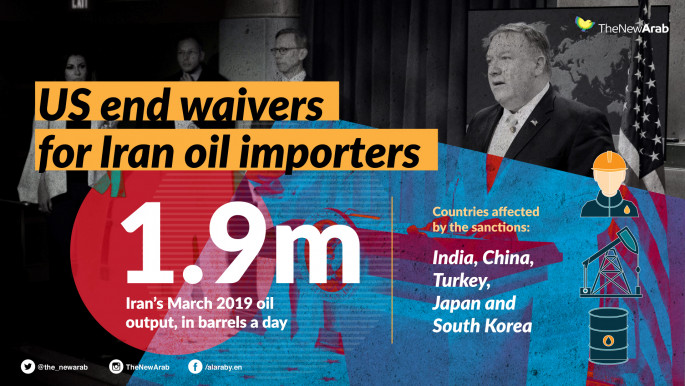Iran threatens to shut Strait of Hormuz following US sanctions
The Iranian Revolutionary Guard has repeated its threat to close the strategic Strait of Hormuz, Reuters reported on Monday, as the US outlined new plans to tighten the screws on Tehran.
Iran also said it is prepared for the US decision to end sanctions exemptions to some of its oil customers, an unnamed source inside Iran's oil ministry told Iranian news agency Tasnim, adding that the US will fail in its mission to cut the country's oil exports "to zero".
The White House announced Monday it will not renew oil waivers, which allowed eight countries to continue buying Iranian crude, despite US sanctions.
"According to international law, the Strait of Hormuz is a marine passageway and if we are barred from using it, we will shut it down," General Alireza Tangsiri, the commander of the Revolutionary Guard's navy said Monday, Reuters reported.
The Strait of Hormuz is a major shipment channel in the Gulf. Iran has previously made threats to close the strait if the US interferes in its ability to export oil.
'Act accordingly'
Tehran has monitored and analysed possible scenarios and taken appropriate measures, news agency Tasnim reported, quoting an inside ministry source.
"Iran is not waiting for America's decision or the lack of it to export its oil... We have years of experience in neutralising efforts by enemies to strike blows against our country."
The Iranian foreign ministry has also said the US decision has "no value", Reuters reported, but "because of the practical negative effects of the sanctions" it will be in contact with European partners and neighbours and "act accordingly".
Washington initially gave eight governments six-month reprieves from the unilateral sanctions on Iran. The countries must now end imports of Iranian oil or face US sanctions.
"Today we are announcing the United States will not issue any additional Significant Reduction Exceptions to existing importers of Iranian oil," US Secretary of State Mike Pompeo said in a statement.
The White House said that President Trump administration's decision was intended to "bring Iran's exports to zero, denying the regime its principal source of revenue".
Among the eight countries is India, which has warm ties with Washington but disagrees on the US insistence that Iran is a threat.
Other countries that will be affected include China and Turkey, opening up new friction in contentious relationships if the US goes ahead with sanctions over buying Iranian oil.
The others - Greece, Italy, Japan, South Korea and Taiwan - have already heavily reduced their purchases from Iran.
Israeli Prime Minister Binyamin Netanyahu praised the US decision to end sanctions exemptions, calling it "of great importance" in boosting pressure on Tehran.
Trump last year withdrew the US from an accord negotiated by his predecessor, Barack Obama, which drastically scaled back Iran's nuclear programme in return for promises of sanctions relief.
The Trump administration, backed by Saudi Arabia and Israel, has instead unilaterally imposed sanctions and demanded that other countries follow suit.
US officials say that they are aimed at choking off Iranian revenue so as to reduce Tehran's regional clout, notably its support for militants groups such as Lebanon's Hizballah.
 |
Agencies contributed to this story.
Follow us on Twitter: @The_NewArab





 Follow the Middle East's top stories in English at The New Arab on Google News
Follow the Middle East's top stories in English at The New Arab on Google News
![Netanyahu furiously denounced the ICC [Getty]](/sites/default/files/styles/image_330x185/public/2024-11/GettyImages-2169352575.jpg?h=199d8c1f&itok=-vRiruf5)
![Both Hamas and the Palestinian Authority welcomed the ICC arrest warrants [Getty]](/sites/default/files/styles/image_330x185/public/2024-11/GettyImages-2178351173.jpg?h=199d8c1f&itok=TV858iVg)
